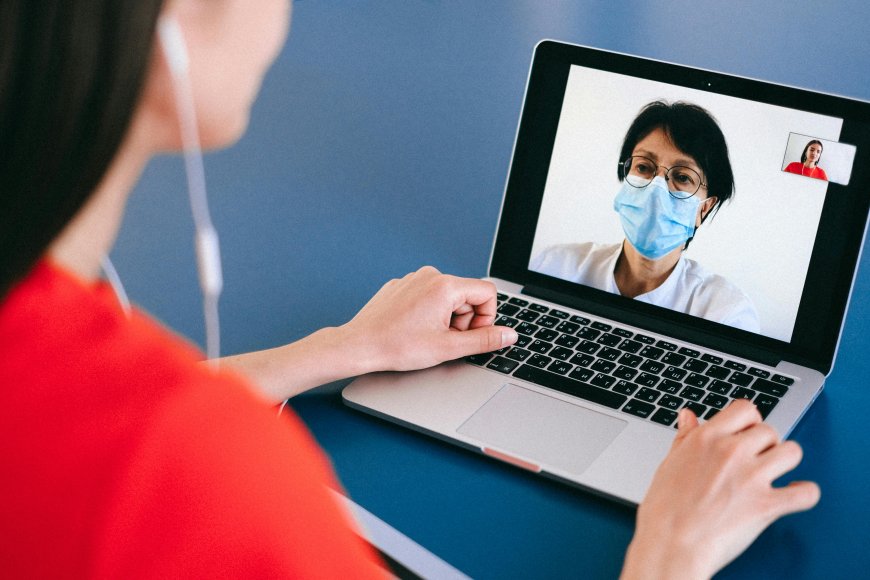How Technology is Revolutionizing the Healthcare Industry
Technology is revolutionizing the healthcare industry in four key areas: 1. Telemedicine: remote healthcare services, increasing accessibility and convenience. 2. Artificial Intelligence: enhancing diagnostic accuracy and speed. 3. Electronic Health Records: streamlining clinical workflows and improving patient care. 4. Personalized Medicine: tailoring treatments to individual needs, improving treatment efficacy. These advancements aim to improve healthcare outcomes, increase efficiency, and reduce costs. However, addressing challenges like equitable access and data security is crucial. By harnessing technology, we can create a healthier future, but patient-centered design and responsible use of technology are essential.

How Technology is Revolutionizing The Healthcare Industry
The healthcare industry is on the cusp of a revolution, driven by technological advancements that are transforming the way care is delivered, received, and experienced. From telemedicine to artificial intelligence, electronic health records to personalized medicine, technology is improving healthcare outcomes, increasing efficiency, and reducing costs.
Telemedicine: Expanding Access to Healthcare
Telemedicine is the use of technology to provide healthcare services remotely, allowing patients to consult with healthcare professionals in real-time without an in-person visit. It includes virtual consultations, remote monitoring, store-and-forward, and mobile health services. Some of its benefits are; Increased accessibility, convenience, reduced wait times, improved patient engagement, and cost saving. Telemedicine is one of the most significant technological advancements in healthcare, enabling patients to receive medical consultations remotely. This innovation is particularly beneficial for rural or underserved populations, who often face barriers in accessing healthcare services. With telemedicine, patients can connect with healthcare professionals via video conferencing, reducing the need for in-person visits and expanding access to specialized care. An example and case study of this process is seen in America’s drive towards improved healthcare;
American Well's telemedicine platform connects patients with healthcare professionals remotely, reducing wait times and increasing access to care.
- Case Study: The University of California, Los Angeles (UCLA) Health System implemented telemedicine to reduce emergency department wait times by 25% and increase patient satisfaction. (https://ucnet.universityofcalifornia.edu/benefits/understanding-your-benefits/details-about-your-benefits/telehealth/)
Artificial Intelligence: Enhancing Diagnostic Accuracy
Artificial intelligence (AI) is another game-changer in healthcare, capable of analyzing vast amounts of medical data to improve diagnostic accuracy and speed. AI-powered algorithms can identify patterns and anomalies that may elude human clinicians, enabling earlier intervention and more effective treatment. In addition, AI-assisted chatbots provide patients with personalized health advice and support, helping to alleviate the burden on healthcare systems. An example and case study is showcased by the University of Chicago;
Google's AI-powered LYNA (Lymph Node Assistant) detects breast cancer from lymph node biopsies with 97% accuracy.
- Case Study: The University of Chicago Medicine implemented AI-powered diagnostic tools to reduce false positives and improve cancer detection. (https://www.uchicagomedicine.org/en/forefront/research-and-discoveries-articles/2017/may/uchicago-medicine-collaborates-with-google-to-use-machine-learning-for-better-health-care).
Electronic Health Records: Streamlining Clinical Workflows
Technology is transforming the healthcare industry in unprecedented ways, revolutionizing how patients receive care, and how healthcare professionals deliver it.
Electronic health records (EHRs) are revolutionizing the way healthcare providers manage patient data, streamlining clinical workflows and enhancing patient care. EHRs enable seamless communication among healthcare professionals, ensuring continuity of care and reducing errors. With EHRs, patients' medical histories, test results, and treatment plans are readily accessible, facilitating informed decision-making and personalized care. An example and case study of this process is seen below:
Epic Systems' EHR software allows healthcare providers to access and share patient data securely, streamlining care coordination.
- Case Study: Kaiser Permanente's EHR system improved patient care coordination, reduced errors, and saved $1.5 billion in costs. (https://healthy.kaiserpermanente.org/health-wellness/health-encyclopedia/he.electronic-medical-and-health-records.abo4950).
Personalized Medicine: Tailoring Treatments to Individual Needs
Personalized medicine (precision medicine) is a medical approach that uses genetic, environmental, and lifestyle data to tailor treatments, identifies specific genetic variations and biomarkers, develops targeted therapies, and integrates data to inform treatment decisions. The goal is to improve treatment efficacy, reduce adverse reactions, enhance patient outcomes, increase efficiency in healthcare delivery, and enable preventive measures. Some examples of this process are; genetic testing for inherited disorders, pharmacogenomics, targeted cancer therapies, and precision psychiatry.
Personalized medicine is a paradigm shift in healthcare, enabled by genetic sequencing and data analytics. This approach is particularly promising for complex diseases, such as cancer, where personalized treatment plans can significantly improve outcomes. An example and case study is seen below;
23andMe's genetic testing provides personalized health insights and risk assessments for patients.
- Case Study: The National Institutes of Health's (NIH) Precision Medicine Initiative uses genetic data to tailor treatment plans for patients with rare diseases. (https://www.nih.gov/about-nih/what-we-do/nih-turning-discovery-into-health/personalized-medicine).
Patient Engagement: Empowering Individuals to Take Charge
Technology is also empowering patients to take charge of their health, with mobile apps, wearables, and patient portals facilitating self-monitoring, education, and communication with healthcare providers. Patients can track their vital signs, monitor chronic conditions, and access personalized health advice, enabling them to make informed decisions about their care. (https://bmchealthservres.biomedcentral.com/articles/10.1186/s12913-022-08501-5)
Addressing Challenges: Ensuring Equitable Access and Data Security
While technology presents numerous benefits, it also raises concerns about data privacy, security, and equity. Ensuring that healthcare technology is accessible to all, regardless of socioeconomic status or geographic location, is crucial. Additionally, protecting patient data from cyber threats and ensuring compliance with regulations, such as HIPAA, is essential.
In conclusion, technology is revolutionizing the healthcare industry, transforming the way care is delivered, received, and experienced. As the world continues to advance, it's essential to prioritize patient-centered design, equity, and responsible use of technology to create a healthier future for all. By harnessing the power of technology, we can improve healthcare outcomes, increase efficiency, and reduce costs, ultimately enhancing the human experience.
What's Your Reaction?





































































































